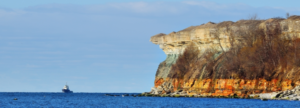البرلمان يصوت على النهب القانوني لبحر البلطيق
“خطة الاتحاد الاوروبي تضفي الصفة القانونية للصيد الجائر“
البرلمانية الاوروبية انيا هازكمب دعت زملائها في البرلمان الاوروبي بالتصويت ضد خطة الصيد لعدة سنوات في بحر البلطيق. وكانت الخطة الأصلية وقف الصيد الجائر لأسماك القد والرنجة وسمك الرنكة في بحر البلطيق. ولكن وفقا للحزب من أجل الحيوان فإن خطة بحر البلطيق أضعِفت بحيث لا شيء فيها ذو حق. “هذه الخطة لاتحمي الأسماك. هذه الخطة تضفي الصفة القانونية على الصيد الجائر” حذرت هازكمب.

حزب من أجل الحيوان انتقد ما يسمى الحد الأقصى للعائد المستدام : أقصى نقطة للصيد في مياه . ووفقا للاتفاقيات الأوروبية القائمة اعتبارا من عام 2020 لا ينبغي أن الصيد خارج حدود الحد الأقصى للعائد المستدام. مع هذه الخطة بحر البلطيق يعتبر استثنائا حيث يحق للصيادين الصيد أكثر.
“السماح بالصيد الجائر في بحر البلطيق سوف يؤدي أيضا إلى الإفراط في صيد الأسماك في المياه الاخرى. الصيادون الحاصلون الآن على استثناء للصيد الجائر ذي الصفة القانونية في بحر البلطيق، سيطالبون قريبا بإستثناء اخر لبحر الشمال والبحر الأبيض المتوسط. خطة بحر البلطيق تمثل سابقة تفتح الأبواب للإستمرار هيكليا في نهب كل المياه الأوروبية. وإذا كان هذا هو الحد الأقصى الذي تريده أوروبا فإن الصيد الجائر لن يتوقف إلا إذا تم استنزاف كل البحار.” حسب انيا هازكمب.
“EU plan legalises overfishing”
MEP Anja Hazekamp calls on her colleagues in the European Parliament to vote against the EU multiannual plan for managing the Baltic Sea. The plan was initially intended to put an end to the overfishing of Baltic Sea cod, sprat and herring stocks. However, according to the Party for the Animals, the Baltic Sea Plan has been mitigated to such an extent that ending overfishing is no longer an option. “This plan does not protect fish; it legalises overfishing,” warns Hazekamp.

Among other things, the Party for the Animals criticises the stretching of the boundaries of the so-called Maximum Sustainable Yield (MSY): the largest yield that can be taken from a species’ stock. From 2020, fishing beyond the MSY limit will not be allowed under the existing European agreements. However, the Baltic Sea Plan introduces exemptions that allow fishermen to cross the MSY limit.
“Allowing overfishing in the Baltic Sea will ultimately lead to overfishing in other waters. Fishermen who are now granted derogations for legally overfishing in the Baltic Sea, will soon demand the same exemptions for the North Sea and the Mediterranean Sea. This Baltic Sea Plan creates a precedent which opens the door to the possibility of a continued structural pillaging of all European waters. If this is all Europe is willing to do, overfishing will not stop until all waters are truly and entirely empty,” according to Anja Hazekamp.